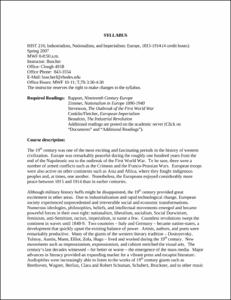Please use this identifier to cite or link to this item:
http://hdl.handle.net/10267/3324| Title: | HIST 216-01, Industrialism, Nationalism, and Imperialism: Europe, 1815 - 1914, Spring 2007 |
| Authors: | Buscher, Frank M. |
| Keywords: | History, Department of;Syllabus;Curriculum;Academic departments;Text;2007 Spring |
| Issue Date: | 10-Jan-2007 |
| Publisher: | Memphis, Tenn. : Rhodes College |
| Abstract: | The 19th century was one of the most exciting and fascinating periods in the history of western civilization. Europe was remarkably peaceful during the roughly one hundred years from the end of the Napoleonic era to the outbreak of the First World War. To be sure, there were a number of armed conflicts such as the Crimean and the Franco-Prussian Wars. European troops were also active on other continents such as Asia and Africa, where they fought indigenous peoples and, at times, one another. Nonetheless, the Europeans enjoyed considerably more peace between 1815 and 1914 than in earlier centuries. Although military history buffs might be disappointed, the 19th century provided great excitement in other areas. Due to industrialization and rapid technological change, European society experienced unprecedented and irreversible social and economic transformations. Numerous ideologies, philosophies, beliefs, and intellectual movements emerged and became powerful forces in their own right: nationalism, liberalism, socialism, Social Darwinism, feminism, anti-Semitism, racism, imperialism, to name a few. Countless revolutions swept the continent in waves until 1848-9. Two countries – Italy and Germany – became nation-states, a development that quickly upset the existing balance of power. Artists, authors, and poets were remarkably productive. Many of the giants of the western literary tradition – Dostoyevsky, Tolstoy, Austin, Mann, Elliot, Zola, Hugo – lived and worked during the 19th century. New movements such as impressionism, expressionism, and cubism enriched the visual arts. The century’s last decades witnessed – for better or worse – the emergence of the mass media. Major advances in literacy provided an expanding market for a vibrant press and escapist literature. Audiophiles were increasingly able to listen to the works of 19th century giants such as Beethoven, Wagner, Berlioz, Clara and Robert Schuman, Schubert, Bruckner, and to other music on the phonograph and even the radio. Darwin, Freud, Einstein, Nietzsche, Pavlov, and others made invaluable contributions to the body of knowledge. This course intends to introduce the student to the political, economic, social, cultural, and intellectual history of 19th century Europe. The focus will be on industrialization, nationalism, and imperialism. In order to maximize student interest and learning, the course will rely largely although not exclusively on a discussion format. Hence, it is vital that students come to class prepared and eager to participate. Course Goals and Assessment: • To familiarize students with the history of 19th century Europe (readings, discussions, presentations) • To assist students in their efforts to improve their written and oral communication skills (papers, discussions, presentations, newspaper project) • To help students frame persuasive arguments (papers, discussions, exams) • To encourage students to think historically (readings, discussions, papers, exams) |
| Description: | This syllabus was submitted to the Office of Academic Affairs by the course instructor |
| URI: | http://hdl.handle.net/10267/3325 |
| Appears in Collections: | Course Syllabi |
Files in This Item:
| File | Description | Size | Format | |
|---|---|---|---|---|
| 2007_sp_HIST_216-01.pdf | 47.27 kB | Adobe PDF |  View/Open |
Items in DSpace are protected by copyright, with all rights reserved, unless otherwise indicated.